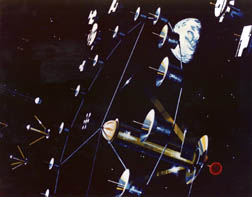|
observer |
|
|
|
|
|
OTHER LINKS |

|

|

|
|
|
|
|
Therefore, scientists believe, that sooner or later, the same thing could happen to Earth once again. So, if we just focus on existing on Earth, we would be trapped during such situations. Apart from that, with the rapid technological advancement, human activities may set off a huge disaster which would affect the whole planet.
Likewise, a main factor that supports space colonization is based on ensuring the survival of the human species by having standby homes out in space. Apart from survival, this is also encouraged in order to spread human life throughout the universe, which, it is believed would make the universe much more beautiful and lively too.
Key Issues
This is such a complex concept that there are many areas which should be taken into consideration. We will look into some of these aspects briefly.
* Location
The universe is so huge compared to our tiny Earth, so, that there are many options to choose from, where locations are concerned. Currently, the main focus is on other planets, satellites and free space.
|
|
Planets such as Mars, Venus, and gas giants like Jupiter are the prime concerns since they show some features which would help colonization.
When talking about satellites, the Moon, which is the closest to Earth, is thought to be a good option, and other satellites like Europa (one of Jupiter's moons), Phobos and Deimos are also considered suitable to establish colonies as well as to find appropriate material. Colonization in 'free space' refers to colonizing asteroids and areas in the Earth's orbit.
* Material
Taking all the material from Earth is going to cost a lot. Therefore, for colonies in the Moon and Mars, the material available on them would be used while the Moon and Near-Earth-Objects (NEO) are supposed to provide materials for free space colonies.
|
|
The Moon would provide large amounts of oxygen, silicon and metals whereas NEOs would provide substantial amounts of metals, oxygen, hydrogen and carbon.
* Energy
Talking about energy in outer space, the best option is solar energy which is available without much disturbance. When the colony is to be set-up comparatively far from the Sun, nuclear power becomes a better option. Special measures would be taken to disperse the massive heat generation in these methods.
* Life support
If people are supposed to live in space colonies, they obviously need air, water, food, gravity and a reasonable temperature to survive. Although the Earth freely provides all these, colonies will have to recycle these extremely limited resources.
|
|
Projects are under way to find more efficient methods to implement life support systems and they have proved to be quite successful.
* Protection
Space colonies may be highly affected by cosmic rays and solar radiation. Therefore, a sufficient amount of mass should be surrounding the colonies to absorb the harmful radiation. This is going to be done by using leftover material (slag) from processing lunar soil and asteroids which would be spread at around 5-10 tons of material per square metre of surface area.
Apart from these, other aspects such as transportation, communication, population size and administering law and order too are key issues. Therefore, the reality of our sweet dream is that, whatever efforts are being taken at present, leaving Earth is not going to be that easy.












